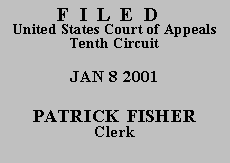 .
.
 .
.
| UNITED STATES OF AMERICA, | |
| Plaintiff - Appellee, | |
| v. | |
| QUINTIN ADKINS, | |
| Defendant - Appellant. |
Defendant pled guilty to multiple counts of possession of illegal drugs with intent to distribute. He reserved the right to appeal the denial of his motion to suppress the evidence.
In a related appeal by his co-defendant, Mr. Clarence Phillips, we reviewed and rejected the motion to suppress. See United States v. Phillips, No. 99-4181 (10th Cir. filed January 8, 2001). Although Defendant makes a more extensive argument than did his co-defendant, nothing here dissuades us from the conclusion we reached in that case. We therefore do not revisit those arguments.
Defendant, however, makes an additional argument regarding the suppression motion not expressly made by his co-defendant, Mr. Phillips. Defendant asserts that the magistrate judge abused his discretion and denied Defendant equal protection by prohibiting proffered testimony about the arresting officer's alleged history of pretextual stops based on the race of the defendants. The defendant relies on Whren v. United States, 517 U.S. 806 (1996). Whren does note that the selective enforcement of the law through practices like racial profiling violates the Constitution. See Whren, 517 U.S. at 813. Such a claim is appropriately brought under the Equal Protection Clause. See id. However, as Whren makes perfectly clear, the fact that Defendant may have an equal protection claim against the arresting officer has absolutely no bearing on whether the officer's traffic stop was reasonable under the Fourth Amendment. See id., United States v. Botero-Ospina, 71 F.3d 783, 787 (10th Cir. 1995) (en banc), cert. denied, 518 U.S. 1007 (1996). So long as the traffic stop was objectively reasonable, the officer's subjective motivations are irrelevant. The magistrate judge correctly concluded as much, and therefore barred the proffered testimony.
Defendant also appeals the trial court's refusal to dismiss a previous indictment in this case with prejudice. There is some ambiguity in the record whether Defendant properly preserved that issue. In any event, we conclude that the trial court carefully considered all the relevant factors in its decision and did not abuse its discretion. See United States v. Saltzman, 984 F.2d 1087, 1092 (10th Cir. 1993).
The final issue is whether Defendant was properly sentenced as a career offender. The government properly concedes that he was not.
We affirm the conviction and sentence except for the part of the sentence attributable to career offender status. We remand to the trial court for re-sentencing.
AFFIRMED in part, REVERSED in part, and REMANDED for re-sentencing.
Entered for the Court
Monroe G. McKay
Circuit Judge
*. This order and judgment is not binding precedent, except under the doctrines of law of the case, res judicata, and collateral estoppel. The court generally disfavors the citation of orders and judgments; nevertheless, an order and judgment may be cited under the terms and conditions of 10th Cir. R. 36.3.